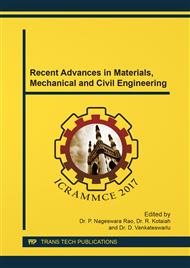p.320
p.327
p.335
p.341
p.347
p.354
p.360
p.366
p.372
Mixed Culture Microalgae-Based Coconut Biodiesel as Fuel to Improve DI CI Engine Performance, Emission Characteristics
Abstract:
The depleting Fossil fuels reserves are caused to look into new Renewable energy sources to fulfill Diesel fuel demand in developing countries such as India. Increasing urbanization is lead to the search for new alternative sources like biodiesel. In India demand of diesel fuel in Industry and Transportation sector. To resolve all the above problems, researchers, scientists were produced biodiesel from first, second and third generation biodiesel sources. Among all the sources Algae was the most Oil rich sources. The byproducts in algae to biodiesel conversion process are most valuable than other. In the present work author tried to work in a new approach, i.e. the mixed culture algae particles are emulsified in pure Coconut biodiesel fuel by using TritonX-100 as a surfactant to prepare an emulsified fuel. This fuel sample was applied to DI CI engine to improve performance, emission characteristics. The experimental results were shown that there is the improvement in diesel engine performance; emission characteristics especially break thermal efficiency and NOx emission reduction than diesel fuel due to its clean combustion.
Info:
Periodical:
Pages:
347-353
DOI:
Citation:
Online since:
February 2018
Authors:
Keywords:
Price:
Сopyright:
© 2018 Trans Tech Publications Ltd. All Rights Reserved
Share:
Citation:


